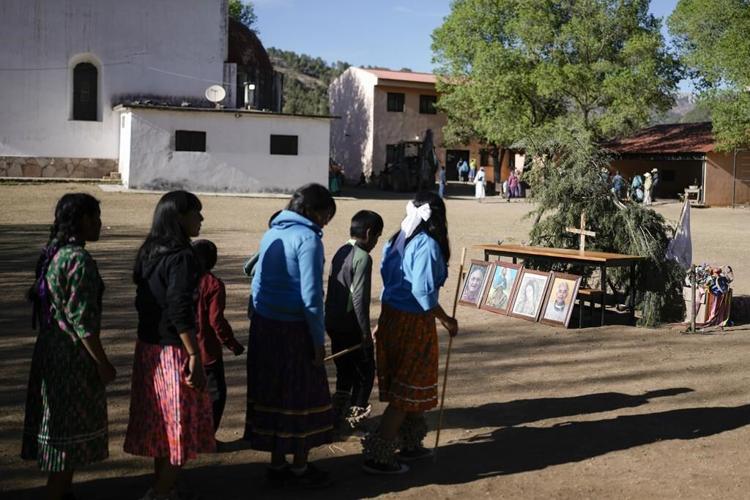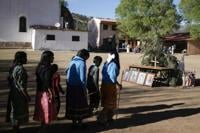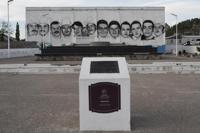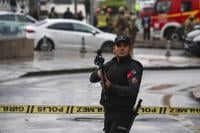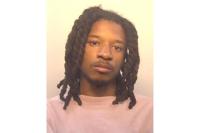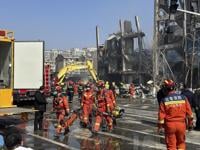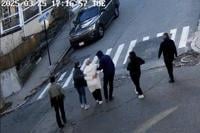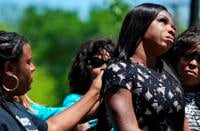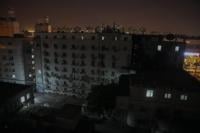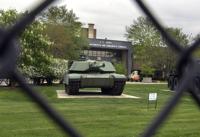CHIHUAHUA, México (AP) — José Portillo Gil, the gang leader known as “El Chueco” — the Crooked One — lowered his gun. The Rev. Jesús Reyes then spoke what he feared might be his final words: Please, don’t take my brothers’ corpses away.
Next to him, at the altar of his church in northern Mexico, Jesuit priests Javier Campos, 79, and Joaquín Mora, 80, lay in a pool of blood.
“I could almost feel the bullets going through my body,” said Reyes, who survived the attack without being shot.
The killings took place in Cerocahui , but the sorrow over the crimes has not diminished in the communities nestled in the remote Tarahumara mountains. Nor have Catholic leaders’ abated.
Since he took power in 2018, President Andrés Manuel López Obrador with cartels and violent gangs controlling and terrorizing local communities. His “ ” policy has drawn extensive criticism from faith leaders, human rights organizations and journalists who have echoed victims’ fears and anger.
Organized crime has long controlled swaths of territory in states such as Guerrero and Michoacan. Many people have been displaced from rural villages in Chiapas by warring cartels and some two dozen candidates have been killed ahead of .
Presidential front-runner and governing party candidate hesitantly met with representatives from the Mexican bishops’ conference. And though she agreed to sign that proposed strategies to reduce the violence in Mexico, the 61-year-old said she did not share the bishops’ “pessimistic evaluation” of the current situation.
“In the time that I have been here in the Tarahumara, I had never faced such difficult times,” said Reyes, whose hearing was severely damaged by the gunshots.
Like some other organized crime leaders, El Chueco, who was linked to the Sinaloa cartel, had control over the local beer market. He financed bars, a baseball team and had a say over local elections and police designations.
“We did not have safety, peace,” Reyes said. “We were always in fear because he even showed up at parties and weddings.”
Hours before El Chueco stormed into the church, furious by the defeat of his baseball team during a match, he shot one of the players and burned his home to the ground. He then headed to a hotel, where tourist guide Pedro Palma had just dropped off foreign tourists and asked El Chueco to behave. Palma, too, was shot and later taken to the church.
“Father Joaquín had just put the holy anointing on him when, all of a sudden, he (El Chueco) took out his gun and shot him twice,” Reyes said. “Then Father Javier looked at him like saying ‘What have you done?’ and he shot him twice, too.”
Members of the ��ɫtv Guard established a permanent base in Cerocahui in response to the killings and the military remained in the area after El Chueco . But that hasn’t deterred locals from abandoning their homes to flee violence and death.
“Here in the mountains, there are many communities displaced by organized crime,” said Azucena González, a teacher from the nearby town of Creel who works at a shelter for women facing risky situations. “We take in many families in which the husband is killed, and the wife can’t stay.”
González’s hometown has a bloody history of its own.
In 2008, soon after then-President Felipe Calderon declared that spiked nationwide violence, armed men opened fire against a group of locals hanging out in a public square. The massacre killed 13, a baby among them.
It was a hellish scene, said Javier Ávila, another Jesuit priest who has worked in the region since the 1970s and arrived promptly at the massacre site.
“There were bodies everywhere,” Ávila said. “But no signs of the police.”
Instead of praying, he reached out to the local authorities and demanded security back-up. He asked the families to refrain from touching the bodies or altering the crime scene. He took late night walks to send a message: “I’m not afraid and I won’t leave.”
Among the inhabitants of the Tarahumara mountains, specially within the Indigenous Raramuri people, priests like Ávila, Reyes and the murdered Jesuits are often regarded as profoundly beloved figures who fearlessly offer comfort and help.
Deep in the Sierra, where no roads or phone signal are available, the Rev. Javier Campos worked closely with the impoverished communities. For his famous imitation of a rooster, he earned the nickname of “Father Gallo.”
Many locals recall that he baptized their children or confirmed their grandchildren. Others remember him dearly for fixing their TVs or teaching them carpentry.
“He taught me how to play the guitar,” said Rarámuri Jesús Vega during a sacred ceremony called Yúmari, which was celebrated on a recent Saturday at the town of Cuiteco.
“When he died, I felt very sad,” Vega said. “They (Campos and Mora) were very well-known priests who spoke our language.”
Despite their deaths, they still seem present among those who ache from their murders.
During the recent Yúmari in Cuiteco, the community placed the Jesuits’ portraits next to the image of a saint to whom they prayed for good harvests and Our Lady of Guadalupe, patron saint of close to 100 million Mexican Catholics.
“We gathered here to ask God to look at us, because we are in need,” said Sister Silvina Salmerón, from the Diocese of Tarahumara, where the murdered priests also served.
Earlier this year, four bishops from the Pacific coast state of Guerrero met with Mexican drug cartel bosses in a bid to negotiate a possible peace accord. The meeting highlighted how the government’s policy of not confronting the cartels has left ordinary citizens to work out their own separate peace deals with the gangs.
“I have felt myself compelled to talk to the (criminal) leaders,” said Ávila, whom the Inter-American Commission on Human Rights deemed in need of security measures for his protection. “Everyone has the freedom and right to do what they believe they should do to achieve peace.”
Often, people knock on his door in Creel. A few ask for a marriage, a divorce or a blessing. Many others seek help to find missing family members or to denounce excessive use of force from the ��ɫtv Guard.
“People still believe in us,” Ávila said.
In the last few days, a Raramuri man called him from a hill where he was hiding from criminals who took control of his ranch. “They threw us out and they are firing at us,” the man told Ávila. “We’ve been here for three days, we’ve run out of food and my children are here with me. What should I do?”
Todos Los Santos Dolores Villalobos, a Rarámuri women’s rights defender, said Ávila, 81, taught her how to approach prosecutors’ offices, civil registries, hospitals and human rights offices to intercede for the Indigenous communities she represents.
“The priests have understood us as Raramuri,” Villalobos said. “We can go and tell them: they (the criminals) cut down our trees, stole our cows, locked us in. They brought destruction.”
“If the priests are at risk, who will guide us?”
____
Associated Press religion coverage receives support through the AP’s with The Conversation US, with funding from Lilly Endowment Inc. The AP is solely responsible for this content.

